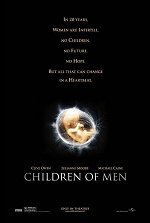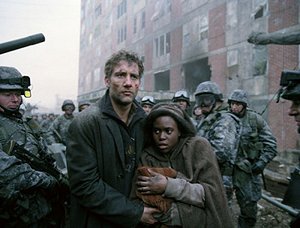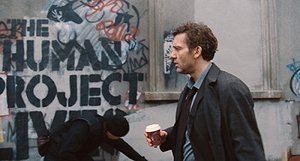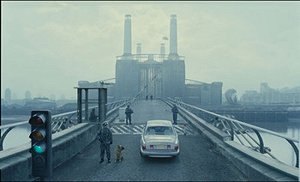 |
|
At The Picture Show
|
February 2007

Dystopian messiah
Cuarón re-imagines the future, humanity and sci-fi with the blistering thriller,
'Children of Men'
Children of Men
Universal Pictures
Director: Alfonso Cuarón
Screenplay: Alfonso Cuarón, Timothy Sexton, David Arata, Mark Fergus and
Hawk Ostby, based on the novel by P.D. James
Starring: Clive Owen, Chiwetel Ejiofor, Michael Caine, Julianne Moore, Claire-Hope Ashitey, Pam Ferris, Charlie Hunnam and Peter Mullan
Rated R / 1 hour, 49 minutes



 (out of four)
(out of four)
People are already referring to it as "the scene." Without giving anything away, it
takes place in the middle of a chaotic and violent war zone. It is one unbroken
shot, lasting six-and-a-half minutes, that follows our reluctant hero from one
pivotal plot point to another. We are literally put right in the middle of the war
zone, as director Alfonso Cuarón weaves us through it in one of the most
impressive feats of technical virtuosity ever committed to film. The scene -
brilliantly effective in drawing us into the urgency of the moment - is among the
most gripping cinematic moments I've ever experienced. I can honestly say I've
never seen anything quite like it . . . and how often can you say that anymore?
 Cuarón's real-time strategy is not only a technical
feat in and of itself, but it capitalizes as a dramatic and emotional payoff. The
scene itself, and the much quieter scene that comes just a few moments later,
clinches Children of Men as the best film of 2006, a genuine masterpiece from a
director who is rapidly becoming one of the best in the field.
Cuarón's real-time strategy is not only a technical
feat in and of itself, but it capitalizes as a dramatic and emotional payoff. The
scene itself, and the much quieter scene that comes just a few moments later,
clinches Children of Men as the best film of 2006, a genuine masterpiece from a
director who is rapidly becoming one of the best in the field.
Even before we get to that key sequence, the film has already separated itself from
the rest of the end-of-the-year rush - and from its own genre. Great films can be
found in all forms and in all genres, but the best are usually those that transcend
that genre. They take the mechanics of the formula to a whole new level, or they
reject the formula altogether and find a new way to tell the story. Children of Men
certainly has a formula, but in the dystopian thriller subgenre, one would be hard-pressed to find anything so fully realized. The "future" in the film is London circa
2027, but it is more concerned with humanity than with differing cultures and
nationalities (though those play a role as well). Humans have become infertile, and
no one can explain why. Society has crumbled, deteriorated into hopeless and
aimless violence that reflects humans' sudden desperation and insignificance and
fear at the prospect of no longer being. It is the near future, but our existence is
bleak.
 Even Theo (Clive Owen), a formerly idealistic
political activist, and his eccentric radical friend Jasper (Michael Caine), once a famous political cartoonist, have resigned themselves to the sad fate of
mankind and bought into the depressing cynicism of the day. Perhaps if there were
some glimmer of hope, their eyes would light up, and they would remember why
they're here, and they would remember what it means to fight. But they've seen no
such glimmer in quite some time. "It doesn't matter," Theo says. "It's all over in
50 years."
Even Theo (Clive Owen), a formerly idealistic
political activist, and his eccentric radical friend Jasper (Michael Caine), once a famous political cartoonist, have resigned themselves to the sad fate of
mankind and bought into the depressing cynicism of the day. Perhaps if there were
some glimmer of hope, their eyes would light up, and they would remember why
they're here, and they would remember what it means to fight. But they've seen no
such glimmer in quite some time. "It doesn't matter," Theo says. "It's all over in
50 years."
But then hope does come. And even when Theo sees it - a young woman, Kee
(Claire-Hope Ashitey), pregnant, protected by a radical revolutionary organization
called The Fishes - he at first resists it. He is not the person he once was. But the
group's leader is Theo's militant ex-wife, Julian (Julianne Moore), and he's roped
into protecting Kee before the government or any military organization can step in
and intervene in any way.
Keith Phipps of The Onion AV Club called Children of Men "a heartbreaking,
bullet-strewn valentine to what keeps us human." That is exactly what I wanted to
say upon first seeing the film, only I didn't have the words for it. This is such a
full-fledged experience that it rejects classification; it works so deeply on so many
levels that, in less than two hours, we are drained, physically and emotionally.
 Children of Men is full of terrible anguish and
almost-unreachable hope. It is a movie that reaches into us and grabs our insides
and pulls us inside-out. Remember what I said about transcending genre? Children
of Men does just that. This is not just a futuristic drama, this is a universally
human drama. It is not about impressing us with special effects; it is about making
an impact on our souls.
Children of Men is full of terrible anguish and
almost-unreachable hope. It is a movie that reaches into us and grabs our insides
and pulls us inside-out. Remember what I said about transcending genre? Children
of Men does just that. This is not just a futuristic drama, this is a universally
human drama. It is not about impressing us with special effects; it is about making
an impact on our souls.
In fact, when we get to the aforementioned climactic scene in the bullet-riddled
war zone, placed in the middle of frighteningly real action, it's very easy to forget
that any of it is taking place in the future. It's just right there, and the urgency
Cuarón captures seems as real as anything set in modern day.
 Cuarón has been building toward this for quite
some time. He has made excellent movies like Y tu mama tambien and Harry
Potter and the Prisoner of Azkaban, the best and most cinematic of the Harry
Potter movies. But he shoots himself into the stratosphere with Children of Men.
He strikes a delicate balance here, too - the film's art direction is phenomenal,
realistically creating a future that looks both familiar and out of reach. The sensory
output of this version of the future is reminiscent in some ways of Minority
Report, only more gray, reflecting the bleak, pessimistic feeling that has
permeated, presumably, the entire world by this point.
Cuarón has been building toward this for quite
some time. He has made excellent movies like Y tu mama tambien and Harry
Potter and the Prisoner of Azkaban, the best and most cinematic of the Harry
Potter movies. But he shoots himself into the stratosphere with Children of Men.
He strikes a delicate balance here, too - the film's art direction is phenomenal,
realistically creating a future that looks both familiar and out of reach. The sensory
output of this version of the future is reminiscent in some ways of Minority
Report, only more gray, reflecting the bleak, pessimistic feeling that has
permeated, presumably, the entire world by this point.
But amid all the despair, he finds the hope and the heart, without ever making it
feel like dramatic manipulations. His film has us in a gut-wrenching emotional
stranglehold, as the very real possibility of death surrounds Theo and Kee even as
our hope at their success grows. Clive Owen - finally starting to get starring roles
after years of going unfortunately under the radar - has never been better, and
Michael Caine, going against type as the film's comic relief, is brilliant as the
cynical old eccentric who delights in telling depressing but hysterical jokes.
It's hard enough for a film to succeed in one area, but when a film works on as
many levels as does Children of Men, it's an astounding accomplishment.
Somehow, the film is depressing, emotionally draining and full of hope all at once.
Cuarón and his screenwriters never pull a punch, and they have crafted the best
film of 2006.
Read more by Chris Bellamy